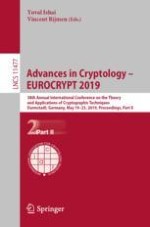
2019 | OriginalPaper | Buchkapitel
Homomorphic Secret Sharing from Lattices Without FHE
verfasst von : Elette Boyle, Lisa Kohl, Peter Scholl
Erschienen in: Advances in Cryptology – EUROCRYPT 2019
Aktivieren Sie unsere intelligente Suche, um passende Fachinhalte oder Patente zu finden.
Wählen Sie Textabschnitte aus um mit Künstlicher Intelligenz passenden Patente zu finden. powered by
Markieren Sie Textabschnitte, um KI-gestützt weitere passende Inhalte zu finden. powered by